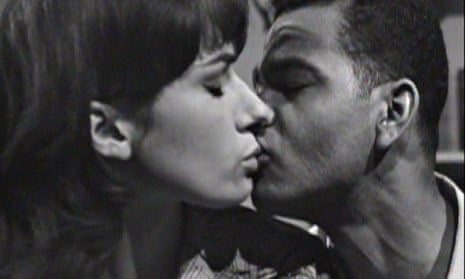It’s an honour often awarded to Captain Kirk and Lieutenant Uhura on Star Trek. More accurately it should go to the young doctors Giles Farmer and Louise Mahler on Emergency Ward 10. But now the British Film Institute has discovered an even earlier instance of the televised interracial kiss.
A Granada Play of the Week, broadcast in June 1962 and called You in Your Small Corner contains the world’s earliest example, the institute believes.
And it is not just a peck: the play features full-on snogging as well as a post-coital scene.
“I was astounded … it was so explicit really,” said the BFI’s TV programmer, Marcus Prince, who discovered the historic kiss while researching an event. “I looked at the date and realised its significance.”
The kiss, between actors Lloyd Reckord and Elizabeth MacLennan, predates by six years the famous kiss between Kirk and Uhura in the third series of Star Trek, the first on US TV. It was also broadcast two years before a kiss between doctors on the British prime time soap Emergency Ward 10.
The one-off play, which went out live, has been written about before, Prince said, but “nobody had really put the connection together that this looks like the first surviving example of a mixed race relationship on television.”
The BFI’s creative director, Heather Stewart, called the play “groundbreaking” and an important “document of British social history.”
She added: “It demonstrates the role of progressive television drama as a reflection of our society and underlines the vital work of the BFI National Archive as the guardian of our national memory. Fifty years on, diverse on-screen representation is still an urgent issue and we must continue as an industry to effect much-needed change.”
Prince said the play itself, written by Barry Reckord, brother of the lead actor, is fascinating in its own right. First staged at the Royal Court theatre, to Granada TV’s credit it was commissioned for TV in much the way it was on stage.
“Not only is there snogging, there is an explicit post-coital scene where they are getting out of bed and getting dressed,” he said.
The play tells the story of a young black intellectual heading to Cambridge who falls for a white working class girl. His mother complains that the girl is not good enough for him and he later becomes ashamed that she can’t compete with his bright new friends at university.
“It subverted what the viewing public of the time was expecting,” said Prince.
There were a few abusive letters to MacLennan and the BFI plans to research whether there was a rise in complaints to the Independent Broadcasting Authority.
But on the whole there were not many waves. The Coventry Evening Telegraph praised it as “intelligent, original and thought-provoking” and the Daily Telegraph mentioned “barriers of class and intellect”.
That is a stark contrast to the fuss over Emergency Ward 10: a more intense encounter was originally planned before ATV executives got cold feet and allowed only a linger-free meeting of lips between actors Joan Hooley and John White.
Soon after the Jamaican-born Hooley was dropped from the show, her character sent to Africa where she died from a snake bite.
Clips from the play will be shown next week at a BFI event, Race and Romance on TV, featuring a panel which includes Adrian Lester, Art Malik and director Gurinder Chadha. The panel will discuss how TV has represented black and minority ethnic relationships over the years and pose questions such as: Where is the black-led romantic primetime series?
The full programme can also be seen for free at one of the BFI’s Mediatheques which can be found in nine venues across the UK.
The main cast and creatives of the play have died but Prince hopes there may be someone who worked on the programme who will get in touch.

Comments (…)
Sign in or create your Guardian account to join the discussion